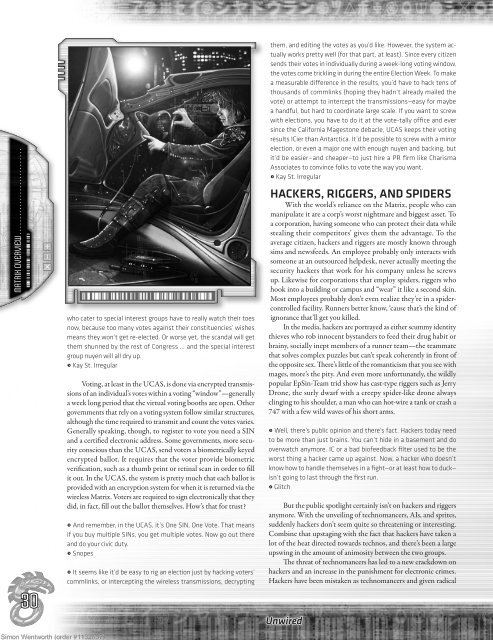comStar Firewall alert - PhaseThrough
comStar Firewall alert - PhaseThrough
comStar Firewall alert - PhaseThrough
Create successful ePaper yourself
Turn your PDF publications into a flip-book with our unique Google optimized e-Paper software.
Matrix overview . . . . . . . . . . . . . . . . . . . . . . . . . . . .<br />
30<br />
who cater to special interest groups have to really watch their toes<br />
now, because too many votes against their constituencies’ wishes<br />
means they won’t get re-elected. Or worse yet, the scandal will get<br />
them shunned by the rest of Congress … and the special interest<br />
group nuyen will all dry up.<br />
> Kay St. Irregular<br />
Voting, at least in the UCAS, is done via encrypted transmissions<br />
of an individual’s votes within a voting “window”—generally<br />
a week long period that the virtual voting booths are open. Other<br />
governments that rely on a voting system follow similar structures,<br />
although the time required to transmit and count the votes varies.<br />
Generally speaking, though, to register to vote you need a SIN<br />
and a certified electronic address. Some governments, more security<br />
conscious than the UCAS, send voters a biometrically keyed<br />
encrypted ballot. It requires that the voter provide biometric<br />
verification, such as a thumb print or retinal scan in order to fill<br />
it out. In the UCAS, the system is pretty much that each ballot is<br />
provided with an encryption system for when it is returned via the<br />
wireless Matrix. Voters are required to sign electronically that they<br />
did, in fact, fill out the ballot themselves. How’s that for trust?<br />
> And remember, in the UCAS, it’s One SIN, One Vote. That means<br />
if you buy multiple SINs, you get multiple votes. Now go out there<br />
and do your civic duty.<br />
> Snopes<br />
> It seems like it’d be easy to rig an election just by hacking voters’<br />
commlinks, or intercepting the wireless transmissions, decrypting<br />
them, and editing the votes as you’d like. However, the system actually<br />
works pretty well (for that part, at least). Since every citizen<br />
sends their votes in individually during a week-long voting window,<br />
the votes come trickling in during the entire Election Week. To make<br />
a measurable difference in the results, you’d have to hack tens of<br />
thousands of commlinks (hoping they hadn’t already mailed the<br />
vote) or attempt to intercept the transmissions—easy for maybe<br />
a handful, but hard to coordinate large scale. If you want to screw<br />
with elections, you have to do it at the vote-tally office and ever<br />
since the California Magestone debacle, UCAS keeps their voting<br />
results ICier than Antarctica. It’d be possible to screw with a minor<br />
election, or even a major one with enough nuyen and backing, but<br />
it’d be easier—and cheaper—to just hire a PR firm like Charisma<br />
Associates to convince folks to vote the way you want.<br />
> Kay St. Irregular<br />
HackerS, riggerS, and SpiderS<br />
With the world’s reliance on the Matrix, people who can<br />
manipulate it are a corp’s worst nightmare and biggest asset. To<br />
a corporation, having someone who can protect their data while<br />
stealing their competitors’ gives them the advantage. To the<br />
average citizen, hackers and riggers are mostly known through<br />
sims and newsfeeds. An employee probably only interacts with<br />
someone at an outsourced helpdesk, never actually meeting the<br />
security hackers that work for his company unless he screws<br />
up. Likewise for corporations that employ spiders, riggers who<br />
hook into a building or campus and “wear” it like a second skin.<br />
Most employees probably don’t even realize they’re in a spidercontrolled<br />
facility. Runners better know, ‘cause that’s the kind of<br />
ignorance that’ll get you killed.<br />
In the media, hackers are portrayed as either scummy identity<br />
thieves who rob innocent bystanders to feed their drug habit or<br />
brainy, socially inept members of a runner team—the teammate<br />
that solves complex puzzles but can’t speak coherently in front of<br />
the opposite sex. There’s little of the romanticism that you see with<br />
mages, more’s the pity. And even more unfortunately, the wildly<br />
popular EpSin-Team trid show has cast-type riggers such as Jerry<br />
Drone, the surly dwarf with a creepy spider-like drone always<br />
clinging to his shoulder, a man who can hot-wire a tank or crash a<br />
747 with a few wild waves of his short arms.<br />
> Well, there’s public opinion and there’s fact. Hackers today need<br />
to be more than just brains. You can’t hide in a basement and do<br />
overwatch anymore. IC or a bad biofeedback filter used to be the<br />
worst thing a hacker came up against. Now, a hacker who doesn’t<br />
know how to handle themselves in a fight—or at least how to duck—<br />
isn’t going to last through the first run.<br />
> Glitch<br />
But the public spotlight certainly isn’t on hackers and riggers<br />
anymore. With the unveiling of technomancers, AIs, and sprites,<br />
suddenly hackers don’t seem quite so threatening or interesting.<br />
Combine that upstaging with the fact that hackers have taken a<br />
lot of the heat directed towards technos, and there’s been a large<br />
upswing in the amount of animosity between the two groups.<br />
The threat of technomancers has led to a new crackdown on<br />
hackers and an increase in the punishment for electronic crimes.<br />
Hackers have been mistaken as technomancers and given radical<br />
Unwired<br />
Simon Wentworth (order #1132857) 9


